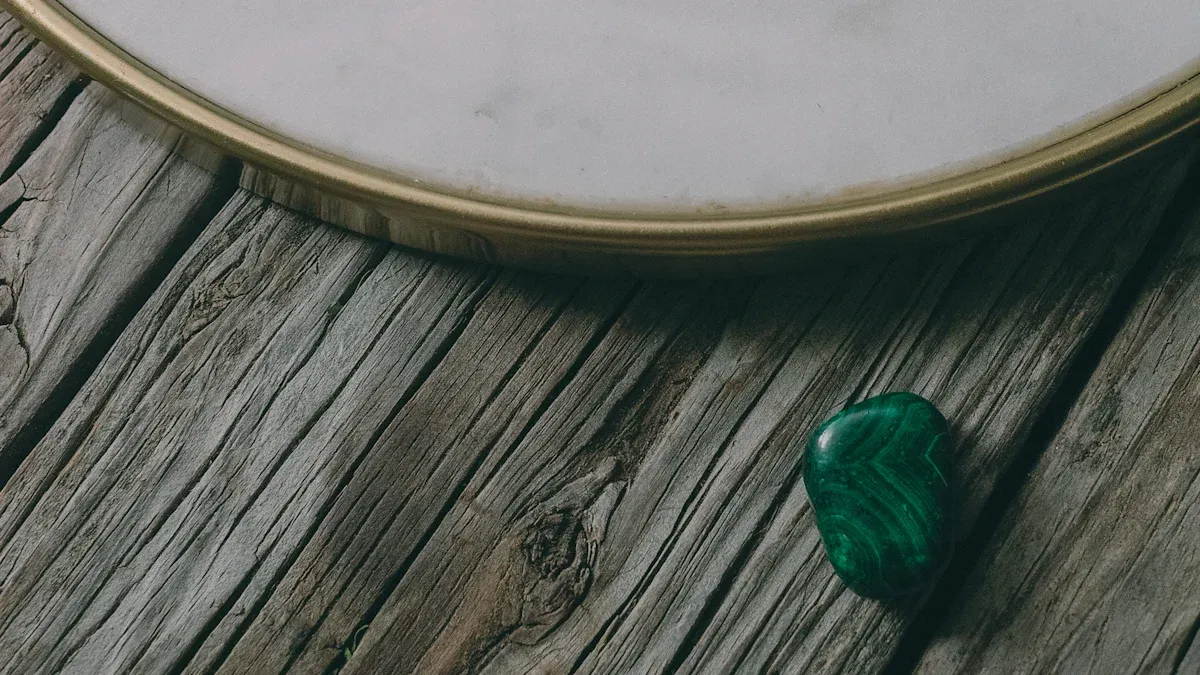
The word Vertu represents more than just a term; it embodies excellence, integrity, and strong moral principles. It is often associated with the concept of virtue, emphasizing the significance of living with admirable values daily. In modern times, Vertu can also signify an appreciation for exquisite craftsmanship and beauty. It seamlessly blends ethical values with artistry and sophistication, creating a timeless concept rooted in virtue. How do you use Vertu in a sentence? You might use it to describe someone’s unwavering honesty or their deep admiration for elegance and masterful creations.
Key Takeaways
-
Vertu means being excellent and having strong moral values.
-
The word comes from Latin, starting as ‘virtus,' meaning bravery and strength.
-
Today, vertu often refers to luxury and great craftsmanship, showing high quality.
-
Knowing about vertu links us to a history of creativity and good morals.
-
Saying ‘vertu' in talks can show love for art and strong values, making your words richer.
The Linguistic Origins of ‘Vertu'
Learning where ‘vertu' comes from shows its rich history. The word has changed over time but kept its meaning of excellence and strength. Let's look at its journey, starting with Latin.
Latin Roots and the Meaning of ‘Virtus'
The word ‘vertu' began with the Latin word ‘virtus'. It comes from ‘vir', meaning ‘man', and first meant bravery and strength. In ancient Rome, it stood for courage and protecting the community. Later, it also meant being smart and having good morals. Cicero, a famous Roman thinker, wrote about ‘virtus' as key to personal and community success. By Livy’s time, a Roman historian, ‘virtus' meant heroic acts and smart values for people and creations.
How Old French and Old English Shaped ‘Vertu'
When Latin turned into Old French, ‘virtus' became ‘vertus'. This change showed how languages and cultures evolved. In Old French, ‘vertus' meant good traits like honesty and bravery, tied to chivalry. When it moved to Old English, it became ‘vertu' and kept its French meaning. In medieval times, ‘vertu' described traits like courage and honesty, which were very important then.
How ‘Vertu' and ‘Virtue' Became Different
Though ‘vertu' and ‘virtue' started the same, they changed. ‘Virtue' became the common word in English, meaning moral goodness. ‘Vertu' got a special meaning, linked to loving fine art and skill. During the Renaissance, ‘vertu' described beautiful, well-made things. Today, ‘vertu' mixes its old meanings with modern ideas of elegance.
Here’s a table showing how ‘vertu' was seen in different languages:
|
Language |
Term |
Meaning/Interpretation |
|---|---|---|
|
Latin |
virtus |
Bravery, strength, excellence |
|
French |
vertus |
Virtues, good qualities |
|
Italian |
virtù |
Excellence, moral strength |
|
Sanskrit |
dharma |
Moral duties, life principles |
|
Chinese |
de (德) |
Virtue, morality, doing what’s right |
This table shows how ‘vertu' means similar things in many cultures. Each language adds its own view, but all focus on being excellent and moral.
Historical Importance of ‘Vertu'
‘Vertu' in Medieval and Renaissance Stories
In old stories, vertu meant being good and noble. Writers used it to show why living with good values matters. For example, Geoffrey Chaucer’s The Canterbury Tales has characters with vertu. These people were shown as wise and honorable. The stories taught readers to value honesty, bravery, and kindness.
During the Renaissance, vertu gained a new meaning. It stood for human potential and aiming for greatness. Writers like Dante and Petrarch wrote about people trying to be excellent in actions and character. This time celebrated how moral strength and smart thinking could lead to success.
Link to Knights and Their Code
Vertu was important in the knights’ code of chivalry. Knights followed rules about bravery, loyalty, and respect. Vertu was the base of these rules. It helped knights act honorably and protect others.
Chivalry wasn’t just about fighting. It also meant being kind and fair. Vertu showed the moral goals knights wanted to reach. By following these rules, knights became examples of strength and honesty in their communities.
‘Vertu' in Art and Ideas
Artists and thinkers used vertu to talk about beauty and goodness. Renaissance art often showed vertu in paintings and sculptures. These artworks showed people with noble traits, inspiring viewers to think about their own values.
Philosophers like Aristotle and Machiavelli wrote about vertu too. Aristotle said vertu helps people live balanced and happy lives. Machiavelli thought vertu meant adapting and succeeding in tough times. These ideas show how vertu shaped art and deep thinking.
How ‘Vertu' Changed Over Time
From Old Times to Modern Day
The meaning of vertu has changed over the years. Long ago, it stood for moral strength and being excellent. People saw it in books, art, and ideas, showing traits like bravery and wisdom. Later, vertu started to mean something more elegant. It became linked to loving beautiful art and fine craftsmanship.
Now, vertu still holds its old meaning but fits today’s world. For example, the name vertu is now tied to luxury brands. It shows a mix of style and new ideas, making it important in a world that values both old traditions and modern progress.
How Vertu’s Meaning Shifted Over Time
Vertu’s meaning has changed a lot through history. In medieval times, it was about chivalry and good morals. It described the traits knights and noble people wanted to have. During the Renaissance, vertu grew to include being smart and creative. It became a sign of human talent and imagination.
Today, vertu has a more specific meaning. The name vertu often refers to fancy items made with great skill. This change shows how vertu went from a broad idea of goodness to a word for luxury and elegance.
Why ‘Vertu' Is Rarely Used Now
Even with its rich past, vertu is not used much today. People don’t say it often in daily talks. This might be because simpler words like “virtue” replaced it. Also, vertu is now mostly used in luxury branding, making it less common for regular use.
Still, the spirit of vertu lives on in art, books, and even technology. The name vertu inspires those who love quality and creativity. Its legacy stays strong, even if it’s not spoken as much anymore.
Modern Interpretations and Usage of ‘Vertu'
How Do You Use Vertu in a Sentence?
You might wonder how to use “vertu” in daily life. Though not common today, it fits certain situations. For example, you could describe someone’s love for fine art or their strong morals. Imagine saying, “Her vertu shows in her handmade jewelry designs.” This sentence shows both the artistic and moral sides of the word.
In modern writing, “vertu” often relates to luxury and exclusivity. For instance:
-
Vertu phones are known for their elegance and quality.
These examples show how “vertu” highlights high standards and sophistication. Using “vertu” in a sentence adds a sense of elegance and excellence.
Cultural and Ethical Relevance of ‘Vertu' Today
Today, “vertu” means more than just a word; it stands for values that matter now. You see it in how people value ethical choices and careful craftsmanship. For example, when a company focuses on quality over quantity, it reflects “vertu.” This link between virtue and artistry makes the word meaningful in cultural and ethical talks.
“Vertu” also connects with ideas like honesty and responsibility. You see this in movements supporting fair trade or local artists. By choosing products that follow these ideas, you live out “vertu” in your choices. It reminds us that excellence is about both beauty and values.
‘Vertu' as a Symbol of Virtue in Art, Literature, and Media
Art, books, and media still use “vertu” to show virtue and greatness. In art, it appears in detailed designs and skilled techniques. Renaissance paintings often showed “vertu” as figures symbolizing strength and beauty. These works make you think about the meaning of virtue in life.
In books, “vertu” is a theme about character and good choices. Modern writers sometimes use it to show the difference between fake success and true greatness. A hero might be described as having “vertu” to show their inner strength and moral actions.
Media and brands also use “vertu” to mix luxury with ethics. For example, the Vertu Quantum Flip Agate Pre-Order Exclusive Package shows this idea. This phone blends advanced tech with fine design, symbolizing strength and style. Owning such a product connects you with “vertu” in a real way.
In all these areas, “vertu” links the past to today, reminding us of the lasting power of virtue and excellence.
The story of vertu shows its link to goodness and strength. Starting from Latin, vertu changed but kept its true meaning. Now, it stands for both moral values and fine design. Vertu appears in art, books, and fancy items, showing lasting ideals. Learning about vertu helps you see how words shape ideas and values. Knowing its past connects you to a history of creativity and virtue that still motivates people today.
Words, like vertu, change but keep connecting us to great ideas.
FAQ
What does “vertu” mean in modern language?
Vertu means being excellent, having good morals, and loving great art. It mixes doing the right thing with creativity, showing style and honesty today.
How is “vertu” different from “virtue”?
Both words are related, but vertu is about loving fine things. Virtue is more about being good and moral. Vertu is often used when talking about fancy and well-made items.
Can you use “vertu” in everyday conversation?
Yes, you can use vertu to talk about someone’s love for art or their strong values. For example, “Her vertu shows in her passion for making lovely jewelry.”
Why is “vertu” associated with luxury brands?
Luxury brands use vertu to show they care about quality. The word makes people think of elegance and high standards, which match fancy craftsmanship.
How does “vertu” inspire modern creativity?
Vertu inspires by mixing old ideas with new ones. It pushes artists to aim for greatness while staying true to good values and timeless beauty.
 New Aura Ring Luxury Fitnesss Tracker
New Aura Ring Luxury Fitnesss Tracker  Lastest Model Quantum Flip
Lastest Model Quantum Flip  Free Shipping Worldwide
Free Shipping Worldwide 24/7 Customer Support
24/7 Customer Support Pay Over Time with PayPal & Klarna
Pay Over Time with PayPal & Klarna



